I originally purchased Noitu Love 2: Devolution nearly a decade ago, back in the days when commercial indie games were rare oddities which often could only be found on the personal sites of their developers, and it’s still one of my favorite games to go back to. I’ve praised the dash mechanics in games like Psi Knuckle and Bleed 2, but this is definitely the game which first made me aware of just how satisfying a well-implemented dash could be. With its incredibly fluid controls which seamlessly combine traversal with combat, Noitu Love 2 has withstood the test of time and easily holds on to its position as one of the best action platformers in existence.
Noitu Love 2 is a game which demands only a single thing from its players – always be active. Whether you’re running through a level or fighting a boss, you rarely stand still for more than a second. This sense of constant momentum comes from the fact that virtually every attack in the game either does not require you to stand still or actively moves you. For example, the primary attack of the protagonist, Xoda Rap, is initiated by clicking the left mouse button while the targeting reticle is over an enemy, which causes her to dash in a straight line to the foe’s location and attack it with no regard for gravity so long as you keep clicking. In addition to your standard attack, you also have a dash which can be used in the air as much as you want with only a small decrease in your height between uses, a decrease which in turn can be partially negated through the use of a spinning attack which slightly boosts your height; the aerial spin can only be used once, but it recharges upon touching the ground or upon damaging an enemy. A grab also exists, which can be used to throw an enemy across the screen as a living projectile, though it doesn’t work on every enemy. The result of all of this is that on top of almost constantly moving, Xoda is also almost constantly damaging enemies through homing attacks, dashes, and spins and spends as much time in the air as she does on the ground.
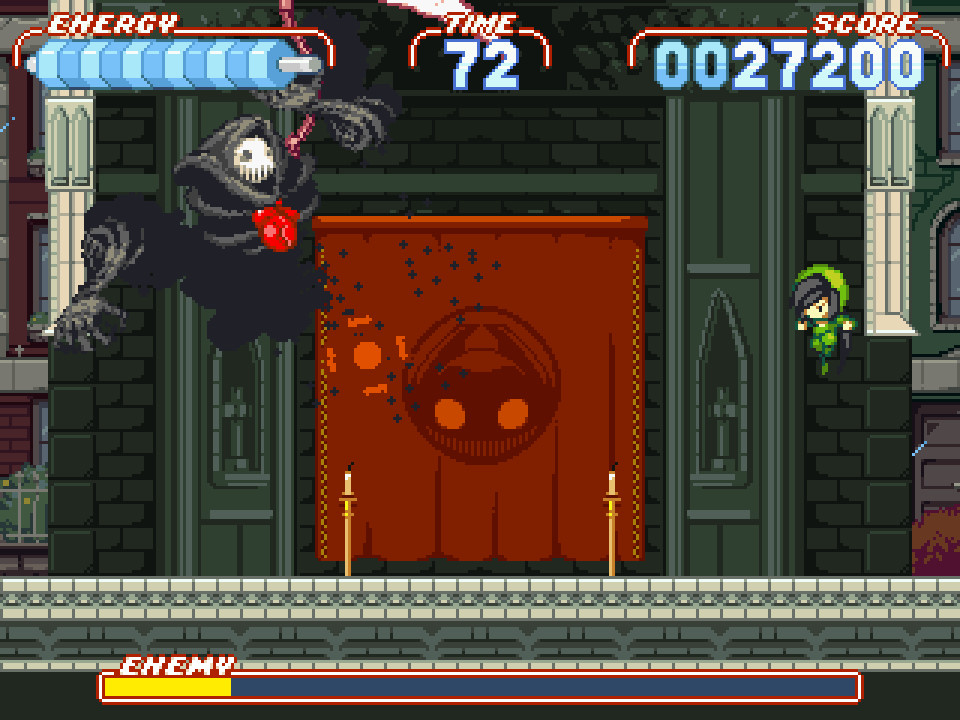
Victory is not merely a matter of button mashing as you’ll inevitably need to pause your assault to dodge attacks or to wait for a boss to expose its weak point, but this doesn’t mean defense involves simply standing around either. In addition to her melee attacks, Xoda can charge up a large energy ball projectile. Xoda can be knocked out of her charge and the damage from this projectile isn’t as high as that of an attack combo would be when the charge time is taken into account, but charging this attack serves as a way to be active even while running away or dodging. Most projectile attacks launched by enemies can be blocked by placing a shield on the screen with the right mouse button, which frees you up to continue attacking other targets or to charge without missing a beat. Downtime still exists, such as in the case of the second boss, 02-Joy, who can only be hurt indirectly while he dances on a stage in the background for the first phase of the fight, but the times when you aren’t attacking, charging an attack, or rushing forward are rare indeed.
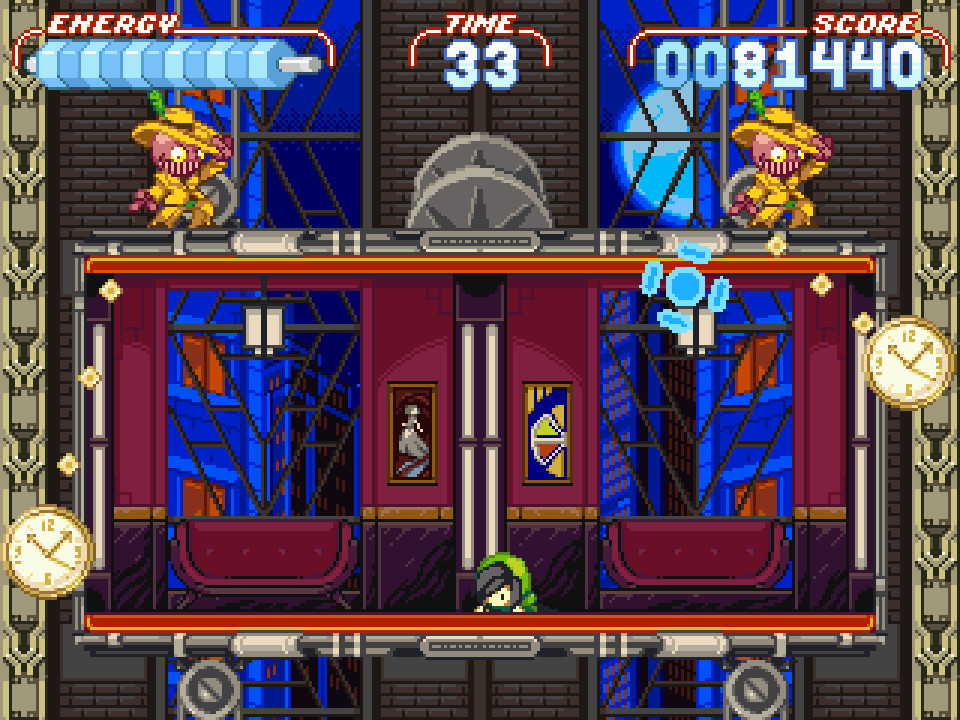
With a total of seven levels which each clock in at about five minutes or so in length Noitu Love 2 can be finished in well under an hour, but not even so much as a second feels like it is wasted. The plot revolves around fighting off a revived army of grinning robots known as the Darns in a world where various time periods have paradoxically been merged together. From brawling with robotic gangsters in a rapidly rising elevator in a 1930’s speakeasy to dodging rubble in a while falling through a Victorian clock tower sent crumbling by the ‘Grin’ Reaper, the setting allows for some rather creative setpiece moments spread throughout wildly different locations. In addition to the bigger setpiece moments, progression through each level is divided between traditional platforming, autoscrolling sections filled with endless enemy hordes, and screens where you need to fight off a gauntlet of enemies or a miniboss before progressing. Enemies are also always thematically appropriate with samurai and kappas in feudal Japan and cowboys and cacti in the Wild West with only a few recurring basic enemy types thrown into the mix to give each level a sense of identity beyond its aesthetics. It’s a crazy journey from start to finish where you never know who or what will be thrown at you next.
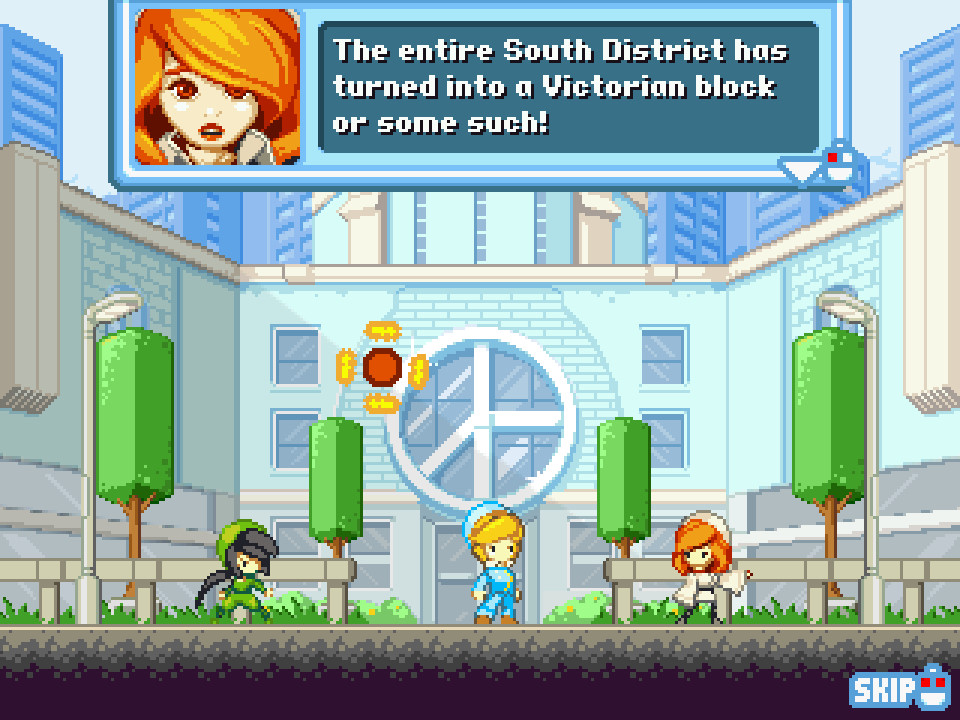
There are some rather strong similarities between Noitu Love 2 and the Bleed series and the presence of a cornucopia of big bosses is one of them. To be clear, the content in the other portions of the levels plays a far larger role here than it does in either of the Bleed games, but with two or three bosses in every single level these fights still account for a high amount of the time players will spend with this game. Bosses attack quickly and often leave little room for safety so it’s a good thing that the game accounts for this with constant and consistent telegraphs. If a boss is about to hit a large area, such as by charging across the screen or by raining down projectiles, large arrows will appear to point out the general path of the attack. Likewise, larger bosses consisting of multiple parts will always flash the specific part of the boss which is about to launch an attack to draw your attention to it and any particularly dangerous attacks, such as a close-range burst or a flamethrower, are signaled by a skull symbol flashing across the entire screen, often accompanied by a tell from the boss itself to hint at just what the nature of the attack will be. There are a few instances where attacks will likely catch players off guard the first time around, such as in the previously-mentioned fight against 02-Joy when swords abruptly stab up from the ground with no warning beyond a symbol indicating that some sort of sword-based attack is going to appear from somewhere, but these cases are rare and the signals combine with the movements of the bosses themselves allow fights to feel fair while providing bosses with many fast and dangerous attacks.
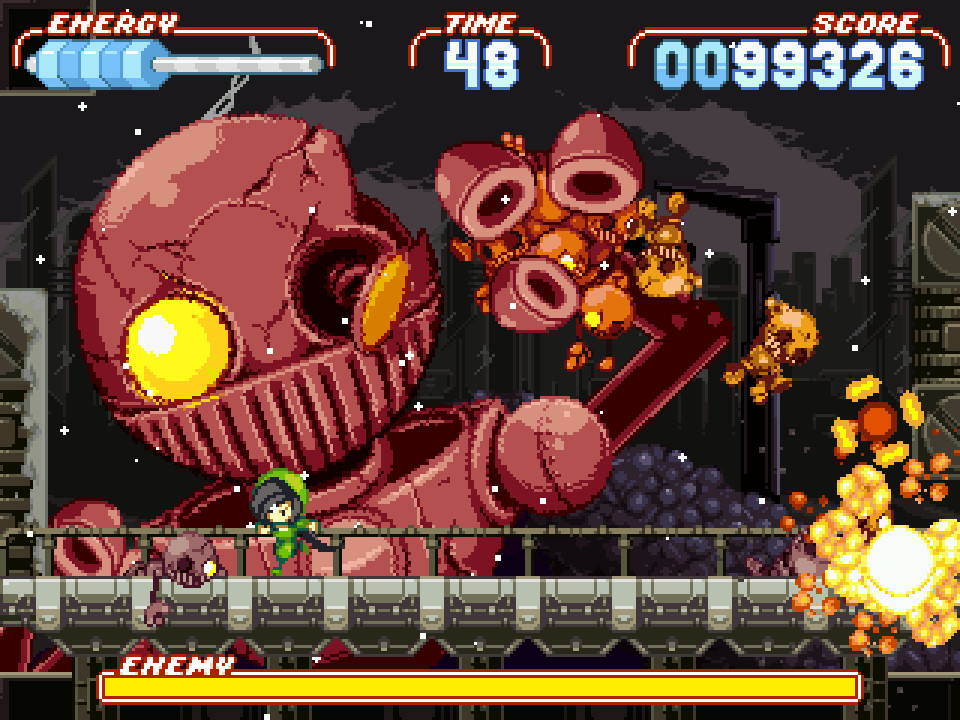
Boss fights tend to be designed around an unusually loose interpretation of the rule of three. Nearly every boss has a point where it stands still and leaves itself open to attack and getting in hits during three, possibly four, such instances is usually enough to deplete a boss’s health. However, where Noitu Love 2 differs from the usual implementation of this formula is in the fact that many bosses are never completely invulnerable. You may not be able to get in as much damage on a boss while it is moving around and you may take damage in the process if you don’t keep your distance, but you can still generally chip away at a boss’s health bar throughout a fight to break the standard rule of three by killing it faster. Major end-of-level bosses tend to be more complicated than those found within the levels themselves and the majority of these particular bosses do have invulnerability periods, but even in these cases remembering to charge up shots between opening and being a bit reckless to get in as much damage as possible when the opportunity to do so presents itself can lead to defeating many of these bosses far more quickly.
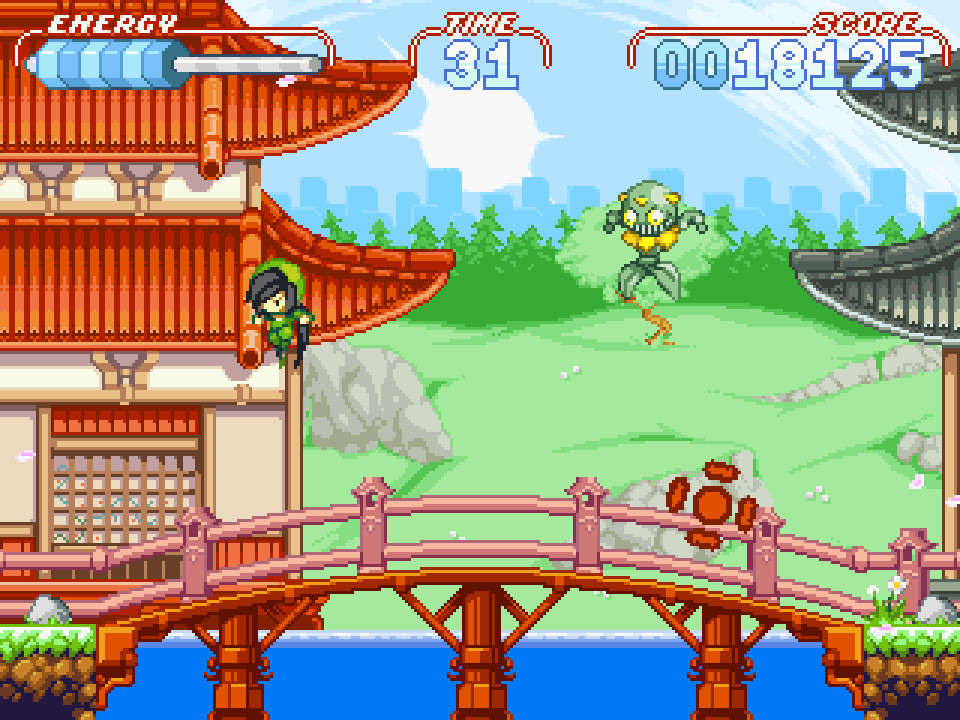
Unlockable difficulties and characters add an immense amount of replay value to the experience. An increase in damage is the most obvious change between difficulties with enemies dealing twice as much damage on Hard as they do on Normal, essentially cutting your health in half, and then dealing what seems to be 1.5x as much damage on the ‘Hardest’ setting on top of that. The changes between difficulties don’t just stop at damage boosts. Levels have more enemies and hazards to confront on higher settings and stronger enemies are added into the mix in earlier areas. Meanwhile, the tells given by bosses are shortened to give you slightly less time to react and many attacks are modified to have more projectiles, move faster, and/or last longer and the bosses themselves have more health.
Each new character can be unlocked by completing the game with the character who came before them and their playstyles are all rather unique. The first unlockable character initially seems like Xoda Rap with a spammable dash attack and an aerial spin alongside a short-range basic attack, but she cannot fly towards targeted enemies and is far less agile in general in exchange for being able to lock on to up to four targets at once to hit with deadly lasers from anywhere on the screen. As to the third character, he has no melee capabilities whatsoever and even his basic platforming capabilities are unimpressive, but he can be picked up and dragged or flung around on the screen and the targeting reticle is used to shoot at enemies using bullets which need to be reloaded by moving the reticle to the bottom of the screen like in a rail shooter; the levels may be mostly the same with the third character, but the gameplay is so utterly different that it feels like an entirely different game, though still an extremely enjoyable one. Add in a score-based ranking system for each level closely tied to your time, combos, and damage taken and you have a game which can easily be replayed several times in a row and one which is just as easy to go back to over and over.
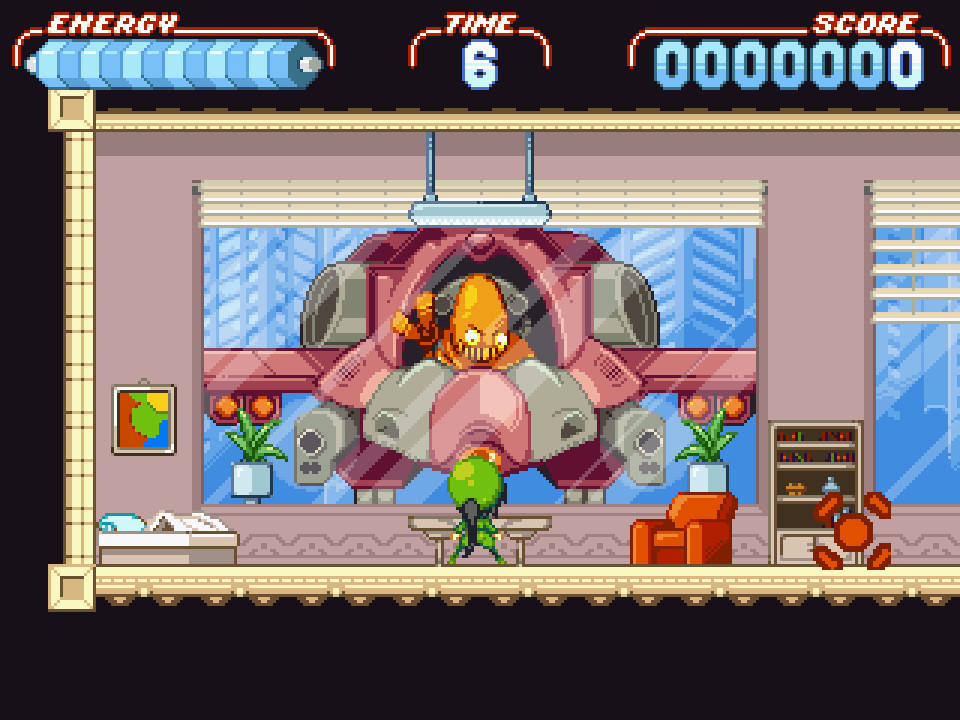
It would be a crime to end an article on Noitu Love 2 without addressing its aesthetics. Areas look great and even with the amount of variety between the levels there is also plenty of variety within the levels themselves; in the feudal Japan level alone you pass through hills lined with cherry blossoms and pagodas while a modern city skyline looms in the background, swim through an underwater cave, run through a deadly bamboo forest, and battle a robotic sea serpent while riding a waterwheel careening down a river. From Mordecai Fluke, the captain of an enormous ship/tank, to the shambling hordes of broken zombie robots, the designs of the enemies and characters are delightfully creative and small animation details give each of them a ton of charm. Rivaling the graphics and complementing the gameplay is the energetic and varied soundtrack filled with memorable songs, my personal favorite being the jazzy “Speak Louder” from the fifth level.
Noitu Love 2: Devolution is a masterpiece which action platformer fans shouldn’t even consider passing up. Incredibly fluid controls, expertly crafted levels, a nearly constant sense of momentum, and significant changes between difficulties and playable characters all combine to make this a timeless classic. This has been one of my favorite games to replay for many years now and it will almost certainly remain so for many years to come.